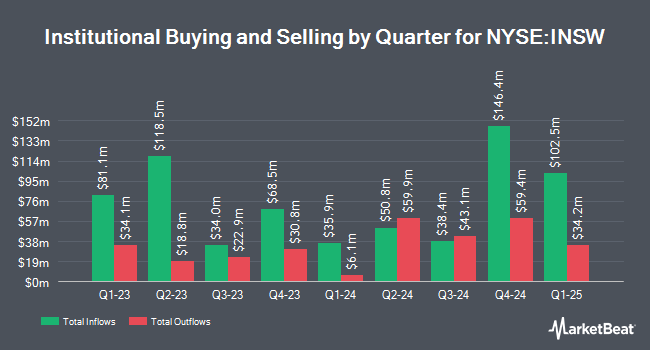JPMorgan Chase & Co. grew its holdings in shares of International Seaways, Inc. (NYSE:INSW - Free Report) by 2.6% during the 4th quarter, according to its most recent 13F filing with the Securities and Exchange Commission (SEC). The institutional investor owned 406,197 shares of the transportation company's stock after buying an additional 10,142 shares during the quarter. JPMorgan Chase & Co. owned approximately 0.83% of International Seaways worth $14,599,000 at the end of the most recent reporting period.
A number of other large investors also recently modified their holdings of the business. Vanguard Group Inc. lifted its stake in International Seaways by 8.4% in the fourth quarter. Vanguard Group Inc. now owns 4,759,119 shares of the transportation company's stock valued at $171,043,000 after acquiring an additional 369,145 shares during the last quarter. Empowered Funds LLC lifted its stake in International Seaways by 470.8% in the 4th quarter. Empowered Funds LLC now owns 273,032 shares of the transportation company's stock valued at $9,813,000 after purchasing an additional 225,196 shares during the last quarter. Principal Financial Group Inc. grew its holdings in International Seaways by 685.6% during the fourth quarter. Principal Financial Group Inc. now owns 224,544 shares of the transportation company's stock worth $8,070,000 after purchasing an additional 195,961 shares during the period. Barclays PLC increased its position in International Seaways by 206.3% during the third quarter. Barclays PLC now owns 259,393 shares of the transportation company's stock worth $13,374,000 after buying an additional 174,695 shares during the last quarter. Finally, Bank of New York Mellon Corp raised its stake in International Seaways by 111.5% in the fourth quarter. Bank of New York Mellon Corp now owns 325,267 shares of the transportation company's stock valued at $11,690,000 after buying an additional 171,498 shares during the period. 67.29% of the stock is currently owned by institutional investors and hedge funds.
International Seaways Trading Down 3.1 %
INSW traded down $1.02 during midday trading on Tuesday, hitting $31.41. 699,824 shares of the company were exchanged, compared to its average volume of 737,116. The firm has a market capitalization of $1.55 billion, a P/E ratio of 3.03 and a beta of -0.01. The firm's 50 day moving average price is $34.62 and its 200-day moving average price is $38.98. The company has a quick ratio of 3.60, a current ratio of 3.60 and a debt-to-equity ratio of 0.32. International Seaways, Inc. has a 1-year low of $27.20 and a 1-year high of $65.94.
International Seaways Cuts Dividend
The company also recently declared a quarterly dividend, which was paid on Friday, March 28th. Shareholders of record on Friday, March 14th were issued a dividend of $0.12 per share. The ex-dividend date was Friday, March 14th. This represents a $0.48 annualized dividend and a yield of 1.53%. International Seaways's payout ratio is 5.72%.
Analyst Ratings Changes
INSW has been the topic of several research analyst reports. Jefferies Financial Group restated a "buy" rating and set a $58.00 target price on shares of International Seaways in a research note on Thursday, February 27th. SEB Equity Research set a $50.00 price objective on shares of International Seaways in a research report on Friday, January 24th. Two analysts have rated the stock with a hold rating, two have given a buy rating and one has given a strong buy rating to the company. According to data from MarketBeat, International Seaways has an average rating of "Moderate Buy" and an average price target of $57.50.
Get Our Latest Research Report on International Seaways
Insider Transactions at International Seaways
In other International Seaways news, SVP William F. Nugent sold 1,000 shares of the company's stock in a transaction on Friday, January 31st. The shares were sold at an average price of $39.10, for a total transaction of $39,100.00. Following the sale, the senior vice president now owns 48,803 shares of the company's stock, valued at approximately $1,908,197.30. This represents a 2.01 % decrease in their ownership of the stock. The sale was disclosed in a legal filing with the SEC, which can be accessed through this hyperlink. Also, CEO Lois K. Zabrocky sold 2,000 shares of International Seaways stock in a transaction dated Monday, March 17th. The stock was sold at an average price of $34.66, for a total value of $69,320.00. Following the completion of the transaction, the chief executive officer now directly owns 179,557 shares of the company's stock, valued at approximately $6,223,445.62. This trade represents a 1.10 % decrease in their ownership of the stock. The disclosure for this sale can be found here. In the last 90 days, insiders have sold 9,400 shares of company stock worth $321,856. Company insiders own 1.90% of the company's stock.
About International Seaways
(
Free Report)
International Seaways, Inc owns and operates a fleet of oceangoing vessels for the transportation of crude oil and petroleum products in the international flag trade. It operates in two segments: Crude Tankers and Product Carriers. As of December 31, 2023, the company owned a fleet of 73 vessels. It serves independent and state-owned oil companies, oil traders, refinery operators, and international government entities.
Further Reading

Before you consider International Seaways, you'll want to hear this.
MarketBeat keeps track of Wall Street's top-rated and best performing research analysts and the stocks they recommend to their clients on a daily basis. MarketBeat has identified the five stocks that top analysts are quietly whispering to their clients to buy now before the broader market catches on... and International Seaways wasn't on the list.
While International Seaways currently has a Buy rating among analysts, top-rated analysts believe these five stocks are better buys.
View The Five Stocks Here
Almost everyone loves strong dividend-paying stocks, but high yields can signal danger. Discover 20 high-yield dividend stocks paying an unsustainably large percentage of their earnings. Enter your email to get this report and avoid a high-yield dividend trap.
Get This Free Report
Like this article? Share it with a colleague.
Link copied to clipboard.